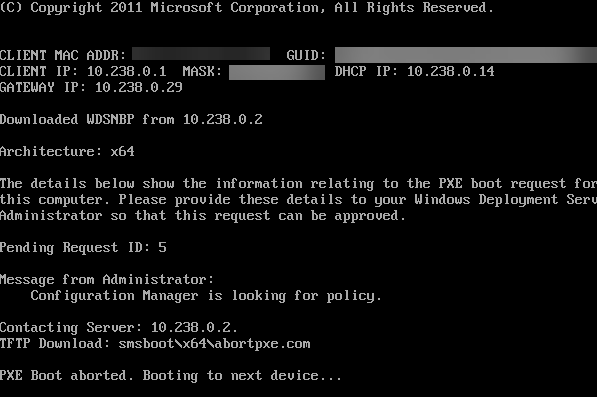

- #Client mac address on boot how to#
- #Client mac address on boot mac os#
- #Client mac address on boot install#
- #Client mac address on boot windows 7#
Once you reboot your machine, the operating system reflects the physical MAC address burnt in your network card and not the MAC address you set.
#Client mac address on boot mac os#
In Linux, Windows, Mac OS X, or a different operating system, changing MAC address is only temporary.
#Client mac address on boot install#
#Client mac address on boot how to#
The example Java source code also shows how to get the client IP address even when the application deployed behind the proxy server. RouterOS DHCP client asks for the following options:ĭHCP client has the possibility to set up options that are sent to the DHCP server. In this article we are going to learn how to obtain the client’s browser IP address when a user visits our Spring Boot web application. Here is a list what I tried: - pulled power cord out of router for 10 secs and pluged in agin.
#Client mac address on boot windows 7#
The brand new laptop is running Windows 7 64bit. I configured dhcp server on the router 2921 with 192.168.1.1/24 but the laptop is get invalid ip address of .x. Then click the link at the top, 'Show Advanced System Information.' Then scroll all the way down and under the COMMUNICATION header you will see Integrated MAC Address 1. DHCP client cannot get an valid IP address. If there is already a default route installed prior to the DHCP client obtaining one, the route obtained by the DHCP client would be shown as invalid. From the BIOS setup, under Main, click System Information. Should the DHCP client be disabled or not renew an address, the dynamic default route will be removed. The default gateway will be added to the routing table as a dynamic entry.

The received IP address will be added to the interface with the respective netmask. Packets that you receive and send are identified by IP addresses (which will also often be not your direct LAN IP, but an IP of your router + NAT). Sender and receiver MAC addresses are only used inside of your last hop Ehternet LAN in the most typical scenario. So i went into the bios and in devices and I/0 port I opened network setup and disabled active LAN or something like that but when I reboot the computer I still did it so I checked in the bios and It. The static IP addresses 10.0.0.253 and 10.0.0.254 are reserved for svr1 and svr2, which are identified by their MAC addresses. The computers at school do this to boot into the network at start-up. Otherwise, some boot loaders do not know how to obtain their configuration files, which causes them to reboot the client, to hang, or to display a prompt such as boot: or grub>. The client will accept an address, netmask, default gateway, and two DNS server addresses. MAC address is the least of your worries regarding privacy in the internet. client mac address and its shows this / turning and a bunch of numbers. The MikroTik RouterOS DHCP client may be enabled on any Ethernet-like interface at a time. The MikroTik RouterOS implementation includes both server and client parts and is compliant with RFC 2131. i dont want to go to a tech store and have them charge me a arm and a leg for something i can do myself. this laptop is an 07 but the harddrive broke so i bought a new one but its a 2013 model. Just you need to follow the few steps of the video. PXE-E53: no boot filename received PXE-MOF: exiting broadcom PXE ROM i would like some help on what i can do to fix this. I have it working when I have the mac address of the client machine hardcoded into the dhcpd.The DHCP (Dynamic Host Configuration Protocol) is used for the easy distribution of IP addresses in a network. Hello Guys In this video, I will Show you how easily you can fix the Client MAC ADDR Boot error. The server is the router, dhcp server, and tftp server (not using a physical router).Ĭurrently I have isc-dhcp-server, tftpd-hpa, nfs-kernel-server all installed and configured on my debian server. My goal: have a server (debian) on a private lan that provides tftp booting to any client machines plugged into the switch that the server is connected to - the server doesn't need outside Internet access, it will only be used for serving up different iso's to the connecting client machine (for os loads).


 0 kommentar(er)
0 kommentar(er)
